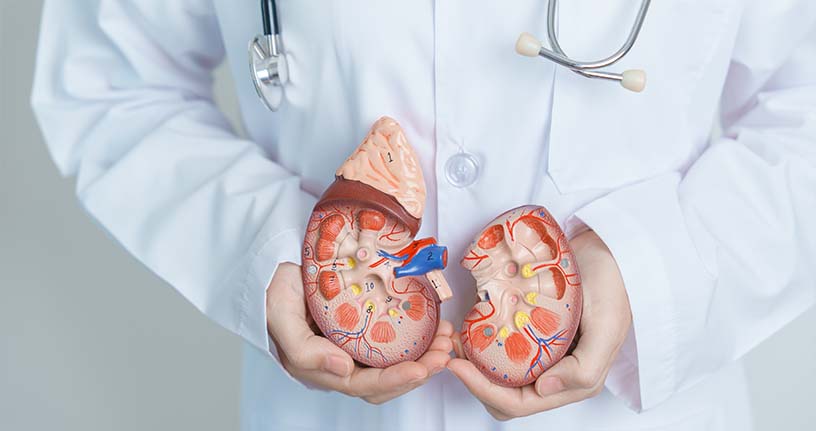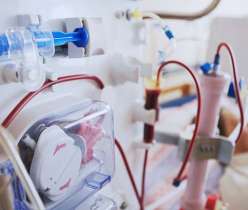Arenal glands, also called suprarenal glands, are small triangular-shaped glands present on top of both kidneys. These glands produce hormones that help regulate metabolism, blood pressure, immune system, response to stress, and other important functions. They are composed of two parts, the cortex and the medulla, which are known to produce different hormones. When adrenal glands can’t release enough hormones, this can give rise to adrenal insufficiency (Addison’s disease).
Functions of Adrenal gland
Adrenal glands are known to produce and release certain hormones, which include:
-
- Cortisol: This is a glucocorticoid hormone that plays various essential roles. It helps to manage the body’s proteins, fats, and carbohydrates. It regulates blood pressure, suppresses inflammation, controls sleep-wake cycles, and increases blood sugar. When you are stressed, your adrenal gland tends to release cortisol, which helps your body get an energy boost.
- Aldosterone: Aldosterone is a mineralocorticoid hormone crucial for regulating blood pressure and the blood’s electrolyte (sodium and potassium) levels. This means aldosterone helps determine the nature of blood pH (whether acidic or basic) by controlling electrolyte levels in your bloodstream.
- DHEA and androgenic steroids: These are male hormones that don’t have much biological impact. They are converted into estrogens (female hormones) in the ovaries and into androgens (male hormones). Androgens are male hormones, but females tend to produce a small number of androgens, too naturally.
- Epinephrine and norepinephrine: These hormones are called the fight or flight hormones and called catecholamines. They can potentially increase your heart rate and force of heart contractions, increasing blood circulation to your muscles and brain and supporting glucose metabolism. They are also effective at controlling the squeezing of your blood vessels, which helps maintain blood pressure. When you are physically or mentally stressed, your adrenal gland often produces adrenal hormones.
These hormones come under two broad categories:
-
- Catecholamines: These are similar substances that your body releases into your bloodstream in response to emotional and physical stress. The primary ones include epinephrine, norepinephrine, and dopamine. The inner part of the adrenal gland called the medulla, produces, and releases the catecholamines epinephrine and norepinephrine.
- Steroid hormones: Steroid hormones are effective at controlling metabolism, immune system functions, salt and water balance, development of sexual characteristics, and the ability to withstand illness and injury. The outer part of the adrenal gland, known as the adrenal cortex, produces all types of steroid hormones (including glucocorticoids and mineralocorticoids).
Adrenal glands may develop nodules that can either be benign or malignant, which can potentially cause the excessive production of certain hormones, ultimately leading to various health problems.
Disorders affecting the adrenal glands
There are several different conditions affecting adrenal gland disorders. They develop when they make excessive or not enough of one or more hormones. Some adrenal disorders are temporary, while others are lifelong. Causes of adrenal gland conditions include:
-
- Autoimmune diseases
- Genetic mutations
- Damage to adrenal glands through infection, blood loss, or injury.
- Certain steroid hormones, including g dexamethasone and prednisone
- Tumors such as pheochromocytomas
- A problem with your hypothalamus or pituitary gland that both helps in the regulation of your adrenal glands
Conditions that affect the adrenal glands include:
-
- Addison’s disease: It is an autoimmune disorder that causes your adrenal glands to release lower-than-normal levels of aldosterone and cortisol.
- Congenital adrenal hyperplasia: This is an adrenal gland problem you are born with, and this happens when your body lacks an enzyme that your adrenal glands require to make hormones.
- Cushing’s syndrome: This adrenal gland disorder occurs when your adrenal gland has excessive cortisol. It usually occurs due to a tumor or certain medicines.
- Unwanted/excessive hair growth: Also known as hirsutism, excessive hair growth may occur in females.
- Massive bilateral adrenal hemorrhage: Also known as Waterhouse-Friderischsen syndrome, this is an acute adrenal gland condition that gives rise to adrenal gland failure due to bleeding into the gland. It is usually related to a severe infection called sepsis.
- Conn’s syndrome:Also called primary aldosteronism, this condition occurs when your adrenal glands produce excessive aldosterone.
Symptoms of adrenal gland problems
The symptoms of adrenal gland disorder usually depend on the hormone affected. A lot of adrenal gland symptoms are like those of other illnesses.
Signs and symptoms associated with adrenal gland hormone include:
-
- Immune system symptoms: frequent infections or sickness, adrenal gland fatigue. Tiredness is one of the common symptoms of adrenal fatigue.
- Metabolism symptoms: Unexplained weight loss, weight gain, low blood sugar, frequent high blood sugar, fatigue, and weakness.
- Sexual characteristics and symptoms: These affect females and prepubescent males developing acne, growing facial hair, balding, becoming more muscular, or having a deeper voice.
- Blood pressure symptom: Hypertension (high blood pressure) or Hypotension (low blood pressure).
Adrenal insufficiency symptoms in females include weakness, weight loss, low blood pressure, and extreme fatigue. Craving for salt, nausea, vomiting, dizziness upon standing, and patches of darker skin.
Supplements for Adrenal insufficiency/adrenal fatigue
There is no specific adrenal fatigue test. If unexplained fatigue does not go away, consult your health care professional. He/she may recommend adrenal fatigue treatment, including medications or supplements that help your condition.
There is no single supplement that is appropriate for adrenal gland support. Your healthcare specialist will help you find the best supplements for adrenal fatigue. Vitamin C, B5, B6, and Vitamin E are vitamins for adrenal fatigue.
The adrenal gland produces several hormones crucial for everyday bodily functions. If you develop any adrenal disorder-related symptoms or if you are at risk of developing an adrenal condition, speak to your healthcare provider. You may be prescribed for the best adrenal insufficiency treatment.



